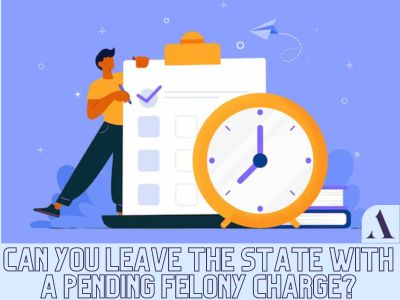Yes, you can leave the country with a felony, but it’s important to research and understand the specific entry requirements and immigration laws of the destination country, as having a felony may affect your ability to travel there.
People with criminal records may not be granted a visa or allowed entry at the border by particular countries due to their strict entry restrictions. It is important to find out whether your felony conviction could cause issues by researching the arrival and visa laws of the destination.
In order to investigate any exceptions or legal options that would enable you to travel despite a felony conviction, you should also speak with your legal representative or an immigration specialist. They are able to offer you advice regarding your particular circumstances and assist you in overcoming any potential legal challenges.
“Can I Leave The Country with a Felony? It’s not just about borders, but about bridging past mistakes.”
by Attorney Law Hub
Can you leave the state with a pending felony charge?

It might have major legal implications to leave a state where there is a pending criminal charge. It is important to be aware that leaving the state where the charge is pending could result in extradition-related problems. One state may request that another state transfer you so that you can answer charges in another state.
Speaking with an attorney is essential if you’re facing a felony charge, so you can learn how your case fits into your state’s legal framework. The best course of action and assistance with the legal process can be obtained from your lawyer.
In other words, you should not leave the state without first consulting with a lawyer if you are facing a significant criminal prosecution. They are able to advise you on safe activities. More legal issues could arise if you leave. In such cases, it’s critical to remain knowledgeable and take the appropriate action.
How long can a case be pending?
A number of important criteria determine how long a case remains pending, and this duration varies greatly. The time it takes to reach a resolution may be greatly impacted by all of these factors. Here’s a breakdown that is more specific:
Case Type:
An important consideration is the case’s characteristics. Certain issues can be settled rather quickly—often in a matter of months—such as minor traffic violations or small claims court complaints. However, complicated situations such as criminal prosecutions, family disputes, or massive business litigation may take years to resolve.
Court Backlog:
The volume of cases that a specific court is handling might have a significant influence. It could take longer for courts with an overflow of cases to set up hearings and trials. This may result in a case taking longer to resolve.
Issue Complexity:
A timeline’s impact can be greatly impacted by the difficulty of the pertinent legal issues. It may take more time to thoroughly examine and deliberate over cases involving several parties, complex legal issues, or a large volume of evidence.
Regulations and Jurisdiction:
Distinct legal systems and regions own their own unique set of regulations and protocols. While some may be renowned for drawn-out court cases, others may have more efficient procedures that result in quicker resolutions.
Communication and preparation:
Effective communication between the parties and their legal agents is crucial in the preparation and communication process. Communication breakdowns or demands for more time for preparation on the part of one party might cause delays.
Appeals and Other Proceedings:
A party may decide to file an appeal if they are unhappy with the decision made in a case, which might result in an even longer process. The processing time for appeals could take a year or more.
For those who have cases pending, it’s critical to control expectations, understand the specifics of their case, and be in constant communication with their legal counsel. Cases can take a long time; therefore, patience is frequently necessary. It is possible to successfully navigate the frequently protracted path toward a settlement by keeping people informed about the status and working with their legal team.
What countries will not let you in with a felony?
People with felony convictions may be restricted from entering many countries or may not be allowed entry at all due to immigration restrictions. These limitations may be imposed for a variety of reasons, but they frequently center on worries about security, public safety, and the possible threat posed by people with criminal histories.
Generally speaking, these regulations cover both short-term tourist visits and people looking for long-term residency or job prospects abroad. Entry may be completely prohibited in certain circumstances, while restrictions—such as the need for a particular visa or permit—may be in place in others.
Some countries known for strict entry policies regarding felons include:

- Canada
- Australia
- New Zealand
- United Kingdom
- United Arab Emirates
- Japan
- South Korea
- Singapore
- China
- Saudi Arabia
Please remember that these recommendations are open to change at any time, so it’s important to confirm the most recent details and criteria by contacting the embassy or consulate of the relevant nation.
Can you leave the state with a pending felony?
A potential criminal charge can present a significant legal challenge while leaving a state. It’s important to realize that you might not be able to leave the state without the right paperwork if you have a felony case against you. Travel limits may be imposed by the court, and disobeying these orders may result in further legal issues.
Speak with your lawyer and the local legal authorities to be sure you’re following the law. They can offer you advice on whether and under what circumstances you can go. Breaking travel limitations because of an ongoing criminal case may result in arrest or bail being suspended.
Can felons travel out of the country?
It can be difficult for someone with a criminal record to leave the country. It is feasible in many situations, but it depends on a number of criteria. The most important facts are as follows:
Passport Eligibility:
Felons can normally apply for a U.S. passport; however, there are some circumstances that may make the application process more difficult. You may not be able to obtain a passport if you have outstanding federal warrants or if you owe a considerable amount of child support.
Parole and Probation:
It can be difficult to travel overseas if you are on parole or probation. To leave the country, you’ll probably need approval from your parole or probation officer. They might have to make sure you won’t endanger the neighborhood or be a flight risk.
Visa and entry restrictions:
Those with criminal convictions have to conform to severe admission restrictions in many countries. Some might demand a visa or extra paperwork, while others might completely refuse entrance. It is imperative that you familiarize yourself with the particular admission requirements of your intended destination.
Customs and Immigration:
Know that you will have to pass through customs and immigration upon your return to the United States. It is important to disclose any criminal history to customs officers during these procedures since they have the right to check your possessions.
Legal Assistance:
Speak with an attorney with experience in this field if you have questions about the laws governing overseas travel for felons. They can offer advice specific to your circumstances.
How long can a felony case be pending?
The amount of time that a criminal case can be pending can vary significantly and is determined by a number of factors. These variables include the complexity of the case, the court’s queues, and the pertinent legal processes.
While certain felonies can be settled in a matter of months or even less in certain situations, others may drag on for a year or longer. It is important to understand that not all felonies have a set time restriction. A fair and complete process is given top priority in the judicial system, and this dedication to fairness occasionally leads to long case pending times.
It is best to consult a lawyer or consult the rules of the local court that is managing the case in order to get the most accurate information about the timeframe of a specific case.
Conclusion
In conclusion, different countries have different entrance rules, making travel difficult if you have a felony conviction. Leaving a state with a felony charge pending may have legal consequences, such as difficulties with extradition. A felony case’s duration varies according to the intricacy of the case and the waiting list in the courts.
It’s important to speak with legal professionals and confirm the particular criteria for each trip, even if many nations have major entrance restrictions for felons. When handling these intricate legal problems, patience and appropriate legal advice are crucial.





What i dont understood is in reality how youre now not really a lot more smartlyfavored than you might be now Youre very intelligent You understand therefore significantly in terms of this topic produced me personally believe it from a lot of numerous angles Its like women and men are not interested except it is one thing to accomplish with Woman gaga Your own stuffs outstanding Always care for it up